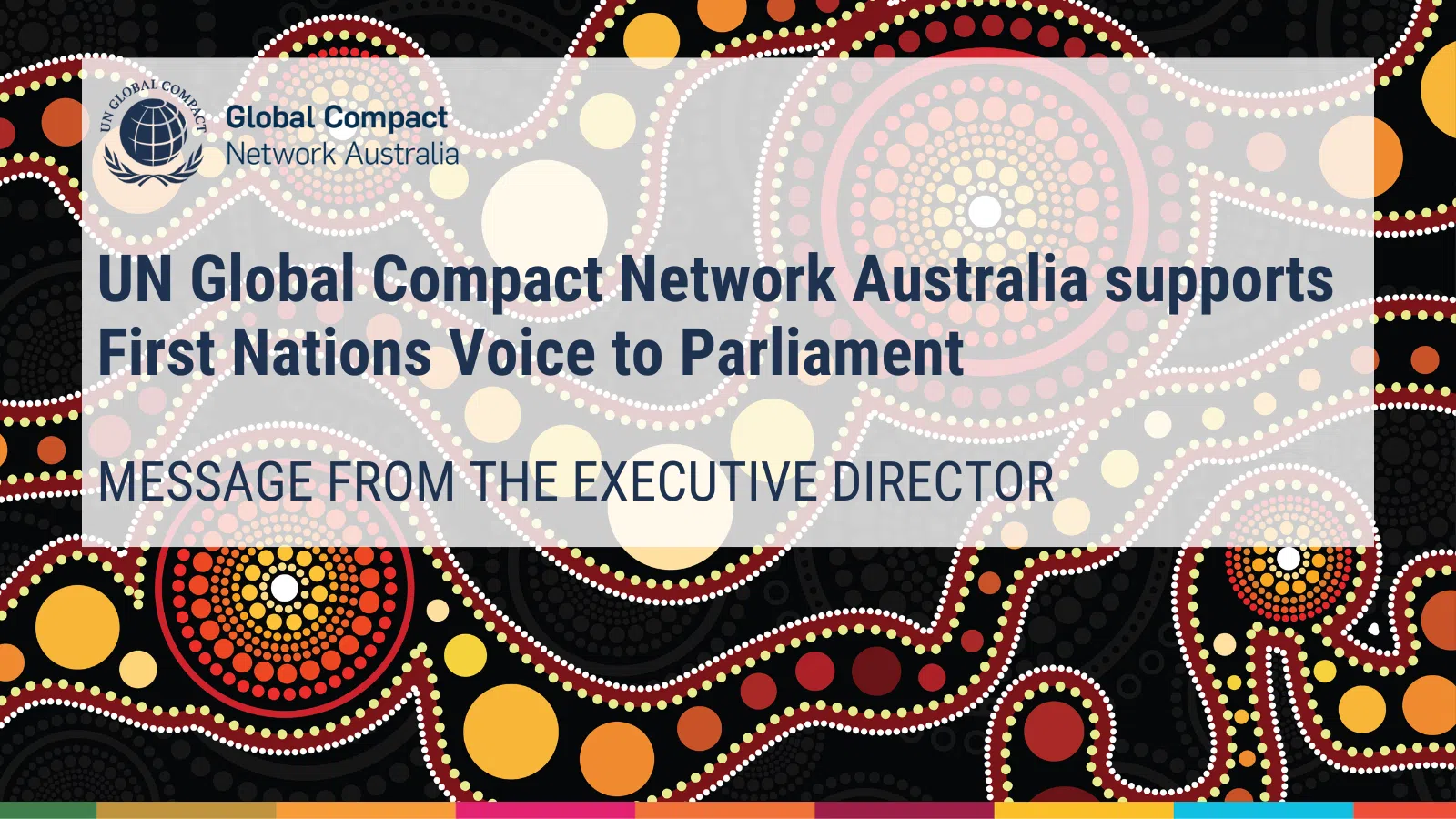
Business & Human Rights, Featured, News, Resources
UN Global Compact Network Australia supports First Nations Voice to Parliament
Kate Dundas | July 4, 2023
Ahead of the 2023 referendum, UN Global Compact Network Australia, the Australian local network of the world’s largest corporate sustainability initiative, announces its support for a constitutionally enshrined First Nations Voice to Parliament.
The purpose of the UN Global Compact Network Australia (UNGCNA) is to empower businesses to act responsibly, set a positive example and create a sustainable future. This is underpinned by our participants’ commitments to the Ten Principles of the UN Global Compact including that businesses should support and respect the protection of internationally proclaimed human rights and take action to advance the Sustainable Development Goals (SDGs).
Supporting a constitutionally enshrined First Nations Voice to Parliament is one way for participating organisations to meet this universal commitment to the Ten Principles and to the SDGs. Here’s why.
Uluru Statement from the Heart
UNGCNA recognises the Uluru Statement from the Heart (The Uluru Statement) as a First Nations-led invitation to walk the path towards reconciliation in Australia. We support The Uluru Statement and its call for a constitutionally enshrined First Nations Voice to Parliament.
The Uluru Statement was the result of an unprecedented consultation process, engaging more than 1,200 Indigenous Australian representatives over a six-month period in 2017. It included the establishment of a First Nations Voice to Parliament and recognition of Indigenous Australians in our Constitution, both of which will be put to referendum this year.
The UN Global Compact’s Ten Principles – businesses should respect the protection of internationally proclaimed human rights
UNGCNA encourages its participants to support initiatives that promote the enjoyment of human rights and advance the SDGs within Australia. Importantly, this includes the internationally recognised human rights of First Nations Australians and relevant SDGs, such as SDG 10 – Reduced inequalities, and SDG 16 – Promote peaceful and inclusive societies for sustainable development, provide access to justice for all and build effective, accountable and inclusive institutions at all levels.
All UN Global Compact participants across the world have made a company-level commitment to the UN Global Compact Ten Principles. Principles One and Two expect that businesses:
- support and respect the protection of internationally proclaimed human rights, and
- make sure that they are not complicit in human rights abuses, which means addressing adverse human rights impacts in which they are involved in line with the UN Guiding Principles on Business and Human Rights.
Supporting the realisation of the right to self-determination
In addition to the responsibility to respect human rights, Principle One of the Ten Principles also encourages businesses to take additional actions that seek to support the protection of internationally proclaimed human rights. This includes the right of First Nations Australians to self-determination, which refers to the right to freely determine one’s political status, and pursue economic, social and cultural development.
The right to self-determination is integral to the United Nations. It is reflected in the United Nations Charter, the Universal Declaration of Human Rights, the International Covenant on Civil and Political Rights and the International Covenant on Economic, Social and Cultural Rights. It is also reflected as a core principle within the UN Declaration on the Rights of Indigenous Peoples (UNDRIP), which was adopted by the UN General Assembly in 2007 in recognition of Indigenous Peoples’ status as culturally distinct and facing distinct challenges. Australia formally endorsed UNDRIP in 2009.
Many legal scholars and commentators have argued that a First Nations Voice to Parliament would advance the realisation of this right – in addition to many other human rights afforded to Indigenous Peoples at the universal level, including the right to political participation and to be consulted on measures to eliminate discrimination.
Elevating First Nations’ voices also advances the SDGs
Enshrining a First Nations Voice to Parliament would also serve to advance the SDGs in Australia, in particular:
- SDG 10 Reduced inequalities. Target 10.2 seeks to “Empower and promote the social, economic and political inclusion of all, irrespective of age, sex, disability, race, ethnicity, origin, religion or economic or other status” by 2030.
- SDG 16 Promote peaceful and inclusive societies for sustainable development, provide access to justice for all and build effective, accountable and inclusive institutions at all levels. Target 16.7 seeks to “Ensure responsive, inclusive, participatory and representative decision-making at all levels”.
A clear path to support
A commitment to the UN Global Compact provides a clear pathway for Australian participants to support a constitutionally enshrined First Nations Voice to Parliament and to engage in the national conversation where appropriate. Participating organisations can support the right of First Nations Australians to self-determination within the company’s core business activities, strategic social investments, philanthropy, advocacy and public policy engagement, and/or partnerships and collective action.
However, action taken to support the rights of First Nations Australians to self-determination must be in addition to, and not a substitute for, broader respect for all internationally recognised human rights.
Earlier this year, we celebrated Reconciliation Week with the 2023 theme ‘Be a Voice for Generations’. Soon, we will have the opportunity to be that voice at the ballot box.
UNGCNA supports the message for reconciliation to live in the hearts, minds, and actions of all Australians, through the 2023 referendum and beyond. Our vision for reconciliation is a future where all Australians are united by our shared past, present, future and humanity.
We encourage all Australian businesses to consider how they can align strategies and operations with ten universal principles on human rights, labour, environment and anti-corruption, and take actions that advance societal goals.
Image credit: Adobe Stock Images, Rashmi Singh, stock.adobe.com.
Contributors: Chris Caskey, Emilia Maubach
Authors: Kate Dundas, Fiona Reynolds


